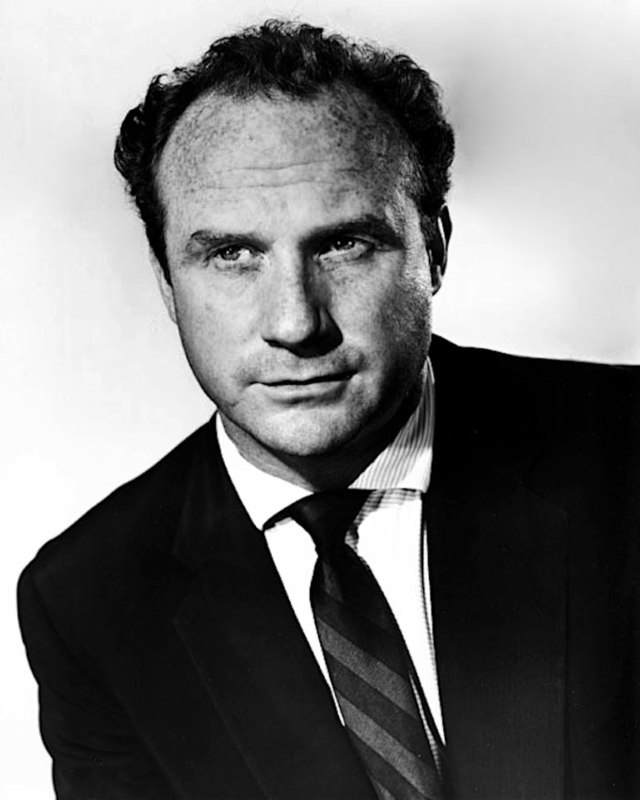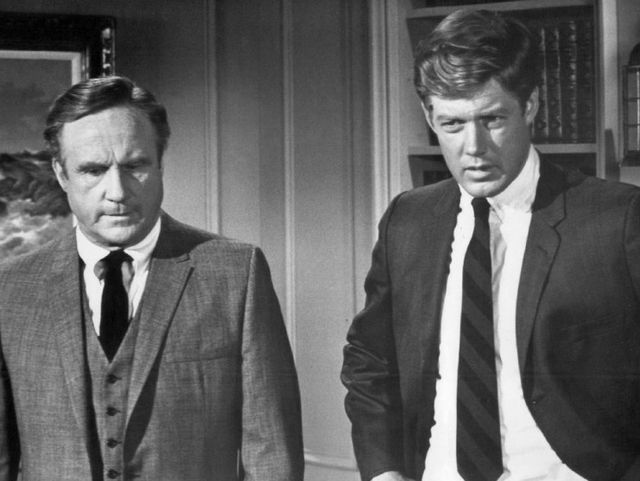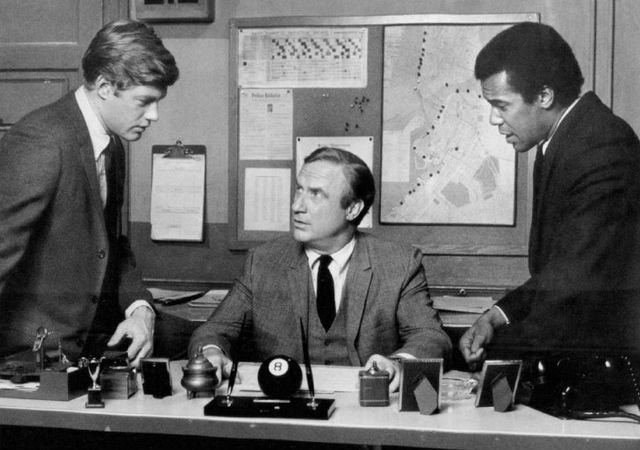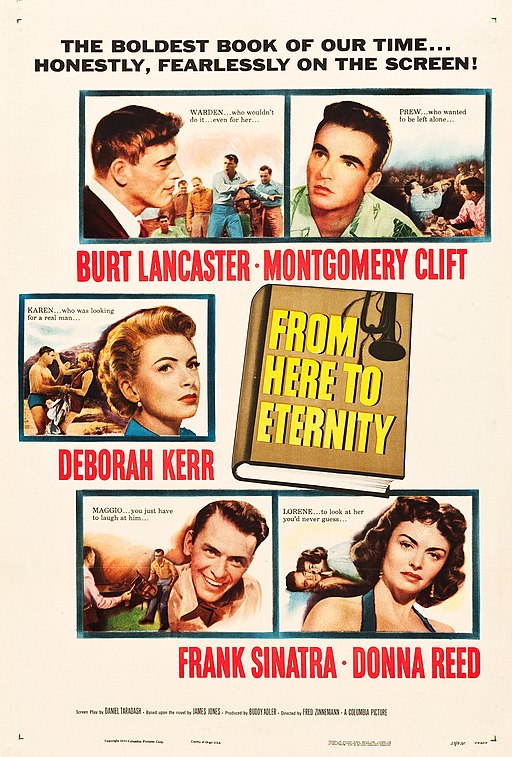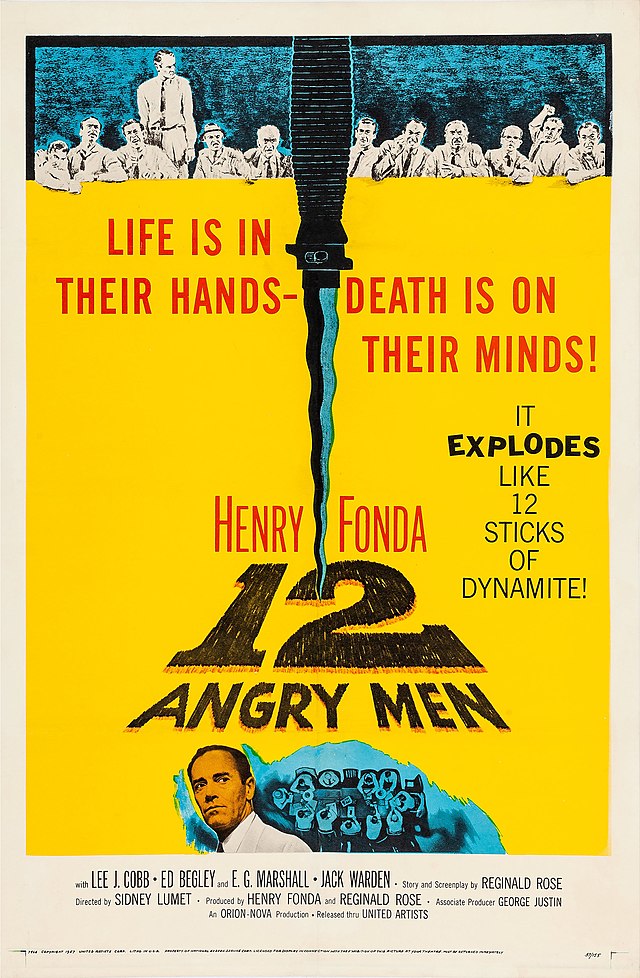Jack Warden (1920 – 2006)
Biography and Movie Career
Jack Warden, born John Warden Lebzelter Jr. on September 18, 1920, in Newark, New Jersey, grew up in Louisville, Kentucky. His early years were anything but conventional. As a teenager, Warden was expelled from high school for getting into a fight. With no interest in academics, he turned to boxing, adopting the ring name Johnny Costello and competing as a professional welterweight. His tough-guy persona and determination were evident even then, but fate had different plans for him.
Before finding his calling as an actor, Warden held a variety of physically demanding jobs, including being a bouncer, tugboat deckhand, and lifeguard. His restless nature led him to join the United States Navy in 1938, serving for three years on the Yangtze Patrol in China. The world was on the brink of war, and by 1941, he had switched to the United States Merchant Marine before ultimately enlisting in the United States Army in 1942.
As a paratrooper in the 501st Parachute Infantry Regiment of the 101st Airborne Division, Warden trained intensively for battle. However, in 1944, while preparing for the Normandy invasion, he suffered a severe leg injury during a training jump in England. This injury changed the course of his life. During his lengthy recovery, he discovered a passion for literature and theater after reading Clifford Odets’ plays. Inspired, he decided to pursue acting—a stark contrast to his rugged past.
The Path to Stardom
After leaving the military, Warden moved to New York City and enrolled at the Dramatic Workshop of the New School for Social Research, funded by the G.I. Bill. He spent years refining his craft, first performing in summer stock theater before joining the prestigious Dallas Alley Theatre company. These years were instrumental in shaping his acting skills, helping him transition from a tough, brawling soldier to a refined character actor.
In 1948, he made his television debut in the live anthology series The Philco Television Playhouse. He gained further experience on early TV drama series like Studio One and Goodyear Television Playhouse, where he honed his ability to embody complex, gritty characters. His big-screen debut came in 1951 with an uncredited role in You're in the Navy Now, alongside future stars like Lee Marvin and Charles Bronson.
However, it was 1957’s 12 Angry Men that cemented Warden as a serious Hollywood actor. Playing Juror No. 7, a brash and impatient salesman eager to leave jury duty for a baseball game, he held his own among acting heavyweights like Henry Fonda and Lee J. Cobb. His ability to convey both comedic and dramatic depth made him a sought-after character actor.
Career Highlights and Acclaim
Throughout the 1960s and 1970s, Warden became a familiar face in both film and television. He had a rare talent for playing gruff yet likable figures—whether corrupt, cynical, or warm-hearted. Some of his most notable performances include:
• Shampoo (1975) – Played Lester Carp, earning his first Academy Award nomination for Best Supporting Actor.
• All the President’s Men (1976) – Portrayed Washington Post editor Harry Rosenfeld, showcasing his ability to command authority.
• Heaven Can Wait (1978) – Another Oscar-nominated role, playing Max Corkle, a lovable trainer caught up in a supernatural mix-up.
• Being There (1979) – Played the U.S. President, sharing the screen with Peter Sellers.
• The Verdict (1982) – Portrayed Mickey Morrissey, Paul Newman's down-and-out legal partner.
• Problem Child (1990) & Problem Child 2 (1991) – Took on a comedic role as Big Ben Healy, delighting a new generation of viewers.
• While You Were Sleeping (1995) – Played Saul, a warm and wise family friend.
Television was also an important part of Warden's career. He won an Emmy Award for his role as Chicago Bears coach George Halas in Brian’s Song (1971). He later starred in the CBS detective series Crazy Like a Fox (1984-1986), earning two Emmy nominations.
Personal Life and Passions
Jack Warden’s personal life was relatively private. In 1958, he married Vanda Dupre, a French actress, and together they had one son, Christopher. Although they separated in the late 1970s, they never legally divorced, maintaining an amicable relationship.
Outside of acting, Warden had a deep love for literature, history, and sports. He remained passionate about boxing, the sport that had once been his livelihood. Despite his Hollywood success, he never strayed too far from his blue-collar roots, often preferring quiet moments over the glitz and glamour of celebrity life.
Final Years and Death
As he aged, Warden’s health deteriorated. By the late 1990s, he began withdrawing from Hollywood, appearing in fewer roles. His final film performance was in The Replacements (2000), playing an owner of a struggling football team.
On July 19, 2006, at the age of 85, Jack Warden passed away in New York City due to heart and kidney failure. Though his passing marked the end of an era, his legacy as one of Hollywood’s finest character actors remains immortal through his unforgettable performances.
Legacy
Jack Warden’s career spanned over five decades, during which he effortlessly transitioned between comedy and drama, proving himself as one of the most versatile and beloved character actors in Hollywood history. His performances continue to resonate with audiences today, reminding us of his authenticity, talent, and dedication to the craft.
Height and Body Features
Jack Warden stood at approximately 5 feet 9½ inches (1.77 meters) tall.
In his earlier years, particularly during his time as a professional boxer under the name "Johnny Costello," he was billed at 5 feet 9 inches and weighed around 190 pounds.
As an actor, he was known for his rugged appearance, characterized by a sturdy build, expressive facial features, and a distinctive gravelly voice, all of which contributed to his memorable portrayals of tough, authoritative, yet often warm-hearted characters.
A Video Tribute to Jack Warden
Jack Warden’s Distinctive Acting Style
Jack Warden was not a conventional leading man, nor did he ever try to be. Instead, he carved out a unique niche as one of Hollywood’s finest and most reliable character actors, embodying roles that were often rugged, no-nonsense, and deeply human. Whether he was playing a grizzled cop, a cynical journalist, or a grumpy but warm-hearted grandfather, Warden had an authenticity and effortlessness that made his performances resonate with audiences.
Naturalistic Yet Commanding Presence
Warden’s naturalistic approach to acting was one of his greatest strengths. He never overplayed a role or indulged in melodrama. Instead, he brought an earthy realism to his characters, making them feel like real people rather than exaggerated caricatures. His performances were often subtle but powerful, with small gestures, facial expressions, and vocal inflections carrying immense weight.
Yet, despite his understated approach, Warden had a commanding presence on screen. He didn’t need to shout or dominate a scene to hold attention—his gravelly voice, expressive face, and world-weary demeanor made him magnetic. Whether standing beside a superstar like Paul Newman in The Verdict or Warren Beatty in Shampoo, Warden never faded into the background.
Mastery of Tough But Lovable Characters
One of Warden’s trademarks was his ability to balance toughness with warmth. Many of his roles were gruff authority figures—judges, coaches, detectives, editors—but he infused them with a humanity and depth that made them more than just archetypes. He was often the wise, experienced mentor, the no-nonsense boss, or the aging tough guy with a heart of gold.
In 12 Angry Men (1957), his character, Juror #7, was a brash, impatient salesman who initially seemed uninterested in justice. Yet Warden brought a dimension to the role, making him more than just an obstructionist—he was relatable, even humorous, in his cynicism.
In The Verdict (1982), he played Mickey Morrissey, Paul Newman’s loyal but weary legal partner. His performance was filled with quiet desperation and resignation, a man who had seen too much failure but still held on to a sliver of hope. His delivery, full of exasperation and wisdom, made him the perfect foil to Newman’s struggling lawyer.
Effortless Comedy and Deadpan Humor
Despite his rugged exterior, Warden had impeccable comedic timing. He didn’t play comedy in a slapstick or exaggerated way; instead, he used deadpan delivery, wry sarcasm, and perfectly timed pauses to make his lines land.
His comedic side was particularly evident in films like Shampoo (1975), where he played Lester Carp, an unfaithful husband who was both pathetic and hilarious in his obliviousness. In Used Cars (1980), he played two roles, twin brothers Roy and Luke Fuchs, showcasing his ability to seamlessly switch between two contrasting personalities. His portrayal of “Big Ben” Healy in Problem Child (1990) and Problem Child 2 (1991) was another example of his ability to be both grumpy and lovable at the same time.
Warden had an inherent understanding of comic rhythm. He knew when to pause, when to react subtly, and when to let his expressions speak louder than words. He wasn’t a loud or boisterous comedic actor, but his dry wit and bemused demeanor made him incredibly funny.
Unpretentious and Versatile
Perhaps Warden’s greatest strength was his versatility. Unlike many character actors who were typecast into a single role type, Warden could play a stern judge, a corrupt businessman, a devoted father, a washed-up boxer, or a grizzled war veteran—and make each role his own.
His performances never felt forced or artificial. He didn’t rely on grand gestures or theatricality; instead, he brought a lived-in quality to his roles, as if he had truly inhabited the characters he played. This authenticity made even his smaller roles stand out.
Even in supporting roles, Warden had an uncanny ability to steal a scene. In All the President’s Men (1976), he played Washington Post editor Harry Rosenfeld with a mix of sharp intellect and sardonic wit. Though he was on screen for limited time, his performance was memorable and essential to the film’s dynamic.
A Legacy of Reliability and Excellence
Jack Warden may not have been a leading man in the traditional sense, but he was the kind of actor who made every movie better just by being in it. Directors trusted him, fellow actors admired him, and audiences loved him because he always delivered a grounded, believable, and engaging performance.
His acting style was built on authenticity, nuance, and an instinct for human behavior. He could be funny, tough, vulnerable, or intimidating—sometimes all within the same role. He was an actor’s actor, a performer who never sought the limelight but always shone within it.
In the end, Jack Warden’s legacy is one of consistency, versatility, and depth. Whether in drama or comedy, film or television, he left behind a body of work that is timeless and unforgettable.
Memorable Film Lines
...And Justice for All (1979) – Judge Francis Rayford:
• "I found out what the meaning of life is."
o When Arthur Kirkland asks, "What's that?"
o Judge Rayford replies, "It sucks."
The Verdict (1982) – Mickey Morrissey:
• "He's a good man? He's the Prince of fucking Darkness!"
o Expressing his skepticism about opposing counsel Ed Concannon.
Brian's Song (1971) – Coach George Halas:
• "Brian Piccolo died of cancer at the age of 26. He left a wife and three daughters. He also left a great many loving friends who miss and think of him often. But when they think of him, it's not how he died that they remember—but how he lived. How he did live!"
Being There (1979) – President "Bobby":
• "Life is a state of mind."
Awards and Recognition
Academy Awards (Oscars):
• 1976: Nominated for Best Supporting Actor for his role as Lester Karpf in Shampoo (1975).
• 1979: Nominated for Best Supporting Actor for portraying Max Corkle in Heaven Can Wait (1978).
British Academy Film Awards (BAFTA):
• 1976: Nominated for Best Supporting Actor for Shampoo (1975).
Primetime Emmy Awards:
• 1972: Won Outstanding Performance by an Actor in a Supporting Role in Drama for his portrayal of Coach George Halas in Brian's Song (1971).
• 1985: Nominated for Outstanding Lead Actor in a Comedy Series for Crazy Like a Fox (1984–1986).
• 1986: Nominated again for Outstanding Lead Actor in a Comedy Series for Crazy Like a Fox.
Additional Honors:
• 1994: Nominated for Best Cast Ensemble by the Awards Circuit Community Awards for Bullets Over Broadway (1994).
Movies with Jack Warden
1950
• The Asphalt Jungle: Warden had an uncredited bit role in this classic heist film that follows a group of criminals planning a major jewelry robbery.
• Sunset Boulevard: He appeared as a party guest in this noir film about a struggling screenwriter's relationship with a faded silent film star.
1951
• You're in the Navy Now: Warden played Tommy Morse in this comedy about the misadventures of a newly commissioned Navy officer.
• The Frogmen: He had an uncredited role as a crew member in this war film focusing on an underwater demolition team during World War II.
• The Man with My Face: Warden portrayed Walt Davis in this thriller about a man confronted by a doppelgänger who takes over his life.
1952
• Red Ball Express: He had an uncredited role in this war film about a supply unit's mission during World War II.
1953
• From Here to Eternity: Warden played Corporal Buckley in this drama set in Hawaii before the Pearl Harbor attack, focusing on the lives of soldiers stationed there.
1957
• Edge of the City: He portrayed Charles Malik in this drama about a dockworker's friendship with a black colleague and their struggles against a corrupt boss.
• The Bachelor Party: Warden played Eddie Watkins, the bachelor, in this drama about a man's pre-wedding night out and the doubts it raises.
• 12 Angry Men: He took on the role of Juror #7 in this courtroom drama where a jury deliberates the guilt of a young man accused of murder.
1958
• Darby's Rangers: Warden portrayed Master Sergeant Saul Rosen in this war film about an American unit during World War II.
• Run Silent, Run Deep: He played Yeoman 1st Class "Kraut" Mueller in this submarine warfare film set during World War II.
1959
• The Sound and the Fury: Warden portrayed Ben Compson in this adaptation of William Faulkner's novel about a Southern family's decline.
• That Kind of Woman: He played George Kelly in this romantic drama about a paratrooper's relationship with a kept woman during World War II.
1960
• Wake Me When It's Over: Warden portrayed Dave "Doc" Farrington in this comedy about a soldier who turns a neglected Pacific island into a thriving resort.
1961
• The Lawbreakers: He played Captain/Acting Police Commissioner Matthew Gower in this crime drama about police corruption.
1962
• Escape from Zahrain: Warden portrayed Huston in this adventure film about a group of prisoners escaping across the Arabian desert.
1963
• Donovan's Reef: He played Doctor William Dedham in this comedy about three World War II veterans living on a South Pacific island.
1964
• The Thin Red Line: Warden portrayed First Sergeant Welsh in this war film about American soldiers during the Battle of Guadalcanal.
1966
• Blindfold: He played General Prat in this comedy-thriller about a psychiatrist involved in a government conspiracy.
1968
• Bye Bye Braverman: Warden portrayed Barnet Weinstein in this comedy about four friends traveling to a colleague's funeral in New York City.
1971
• The Sporting Club: He played Earl Olive in this satire about the eccentric members of an exclusive hunting club.
• Summertree: Warden portrayed Herb in this drama about a young man's struggles with the Vietnam War draft.
• Who Is Harry Kellerman and Why Is He Saying Those Terrible Things About Me?: He played Dr. Solomon F. Moses in this drama about a songwriter questioning his life choices.
• Welcome to the Club: Warden portrayed General Strapp in this comedy about a group of misfit soldiers during World War II.
1973
• The Man Who Loved Cat Dancing: He played Dawes in this Western about a woman who joins an outlaw after fleeing her abusive husband.
1974
• Billy Two Hats: Warden portrayed Sheriff Henry Gifford in this Western about a Scottish outlaw and his Native American partner.
• The Apprenticeship of Duddy Kravitz: He played Max in this drama about a young man's ambitious pursuit of success in Montreal.
1975
• Shampoo: Warden portrayed Lester Karpf in this satirical comedy about a Beverly Hills hairdresser juggling relationships with several women.
1976
• All the President's Men: He played Harry M. Rosenfeld in this political thriller about the journalists investigating the Watergate scandal.
1977
• Raid on Entebbe: Warden portrayed Lt. Gen. Mordechai Gur in this television film about the Israeli rescue mission at Entebbe Airport.
• The White Buffalo: He played Charlie Zane in this Western about Wild Bill Hickok's quest to hunt a mystical white buffalo.
1978
• Heaven Can Wait: Warden portrayed Max Corkle in this romantic comedy about a football player reincarnated after a premature death.
• Death on the Nile: He played Doctor Ludwig Bessner in this mystery about a murder on a Nile river cruise, investigated by Hercule Poirot.
1979
• The Champ: Warden portrayed Jackie, the loyal trainer and friend to a washed-up boxer attempting a comeback while reconnecting with his young son.
• Dreamer: He played Harry, a bowling alley owner who mentors a young man aspiring to become a professional bowler.
• Beyond the Poseidon Adventure: Warden took on the role of Harold Meredith in this sequel, where survivors of a capsized ship encounter further dangers.
• ...And Justice for All: He portrayed Judge Francis Rayford, a suicidal judge presiding over a corrupt legal system, in this courtroom drama.
• Being There: Warden played the U.S. President, referred to as "Bobby," in this satirical film about a simple-minded gardener who becomes an unlikely political insider.
1980
• Used Cars: Warden showcased his versatility by playing dual roles as Roy L. Fuchs and his twin brother Luke, rival used car salesmen embroiled in a fierce competition.
1981
• The Great Muppet Caper: He appeared as Mike Tarkanian, the news editor, in this musical comedy featuring the Muppets investigating a jewel heist in London.
• Carbon Copy: Warden played Nelson Longhurst, the boss of a white executive who discovers he has a black son, leading to personal and professional challenges.
• Chu Chu and the Philly Flash: He portrayed The Commander, a former baseball player teaming up with a con artist to deliver a mysterious package.
• So Fine: Warden took on the role of Jack Fine, a garment manufacturer whose business is saved by an accidental fashion trend.
1982
• The Verdict: Warden delivered a memorable performance as Mickey Morrissey, the supportive friend and former partner of an alcoholic lawyer seeking redemption through a medical malpractice case.
1984
• Crackers: He played Garvey, the leader of a group of misfits planning to rob a pawnshop in this comedy.
1985
• The Aviator: Warden portrayed Moravia, a seasoned pilot mentoring a young aviator during the early days of air mail delivery.
• Alice in Wonderland: He lent his voice to the character of the Owl in this television adaptation of the classic tale.
1986
• The Cosmic Eye: Warden provided the voice for Rocko in this animated film exploring environmental themes.
1987
• September: He played Lloyd in this Woody Allen drama about a group of friends confronting personal crises during a weekend in the country.
1988
• Dead Solid Perfect: Warden portrayed Hubert "Bad Hair" Wimberly, a veteran golfer mentoring a younger player in this sports drama.
• The Presidio: He took on the role of Sgt. Maj. Ross Maclure, a military veteran assisting in a murder investigation that bridges civilian and military jurisdictions.
1990
• Everybody Wins: Warden played Judge Harry Murdoch in this crime drama about a private detective uncovering corruption in a small town.
• Problem Child: He portrayed "Big" Ben Healy, the grandfather of a mischievous adopted boy causing chaos for his new family.
1991
• Problem Child 2: Warden reprised his role as "Big" Ben Healy, dealing with the continued antics of his troublemaking grandson.
1992
• Passed Away: He played Jack Scanlan, the patriarch of a dysfunctional family reuniting after his brother's death.
• Night and the City: Warden portrayed Al Grossman, a boxing promoter involved with a hustling lawyer in this crime drama.
• Toys: He took on the role of Old General Zevo, the founder of a whimsical toy factory facing a militaristic takeover.
1993
• Guilty as Sin: Warden played Moe, a private investigator assisting a defense attorney entangled with a dangerous client.
1994
• Bullets Over Broadway: He portrayed Julian Marx, a theater producer navigating the challenges of staging a new play funded by gangsters.
1995
• While You Were Sleeping: Warden played Saul, a family friend who supports a lonely transit worker mistaken for the fiancée of a comatose man.
• Things to Do in Denver When You're Dead: He portrayed Joe Heff, a terminally ill mob boss orchestrating one final job.
• Mighty Aphrodite: Warden took on the role of Tiresias, part of a Greek chorus commenting on the protagonist's life choices.
1996
• Ed: He played Chubb, the owner of a minor league baseball team who signs a chimpanzee as a player.
1997
• The Island on Bird Street: Warden portrayed Boruch, a Jewish man hiding in the Warsaw Ghetto during World War II, helping a young boy survive.
• The Volunteers: He played Richie in this drama about a group of friends reuniting after many years.
1998
• Chairman of the Board: Warden portrayed Armand McMillan, the eccentric founder of a company who leaves his business to a free-spirited surfer.
• Bulworth: He played Eddie Davers, a political advisor to a disillusioned senator who starts speaking bluntly after a crisis.
• Dirty Work: Warden took on the role of "Pops" McKenna, the lovable but mischievous father of the protagonist, who starts a revenge
1999
• A Dog of Flanders: Warden portrayed Jehan Daas, the kind-hearted grandfather of a young aspiring artist in this adaptation of the classic novel.
2000
• The Replacements: In his final film role, Warden played Edward O'Neil, the owner of a professional football team who assembles a group of misfit players during a players' strike.

